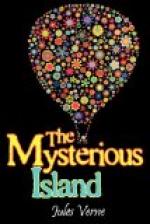By the end of the first fortnight of December these works were finished, and Prospect Heights—that is to say, a sort of irregular pentagon, having a perimeter of nearly four miles, surrounded by a liquid belt—was completely protected from depredators of every description.
During the month of December, the heat was very great. In spite of it, however, the settlers continued their work, and as they were anxious to possess a poultry-yard they forthwith commenced it.
It is useless to say that since the enclosing of the plateau had been completed, Master Jup had been set at liberty. He did not leave his masters, and evinced no wish to escape. He was a gentle animal, though very powerful and wonderfully active. He was already taught to make himself useful by drawing loads of wood and carting away the stones which were extracted from the bed of Creek Glycerine.
The poultry-yard occupied an area of two hundred square yards, on the southeastern bank of the lake. It was surrounded by a palisade, and in it were constructed various shelters for the birds which were to populate it. These were simply built of branches and divided into compartments, made ready for the expected guests.
The first were the two tinamous, which were not long in having a number of young ones; they had for companions half a dozen ducks, accustomed to the borders of the lake. Some belonged to the Chinese species, of which the wings open like a fan, and which by the brilliancy of their plumage rival the golden pheasants. A few days afterwards, Herbert snared a couple of gallinaceae, with spreading tails composed of long feathers, magnificent alectors, which soon became tame. As to pelicans, kingfishers, water-hens, they came of themselves to the shores of the poultry-yard, and this little community, after some disputes, cooing, screaming, clucking, ended by settling down peacefully, and increased in encouraging proportion for the future use of the colony.
Cyrus Harding, wishing to complete his performance, established a pigeon-house in a corner of the poultry-yard. There he lodged a dozen of those pigeons which frequented the rocks of the plateau. These birds soon became accustomed to returning every evening to their new dwelling, and showed more disposition to domesticate themselves than their congeners, the wood-pigeons.
Lastly, the time had come for turning the balloon-case to use, by cutting it up to make shirts and other articles; for as to keeping it in its present form, and risking themselves in a balloon filled with gas, above a sea of the limits of which they had no idea, it was not to be thought of.
It was necessary to bring the case to Granite House, and the colonists employed themselves in rendering their heavy cart lighter and more manageable. But though they had a vehicle, the moving power was yet to be found.
But did there not exist in the island some animal which might supply the place of the horse, ass, or ox? That was the question.




